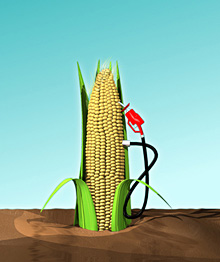
|
 |
 |
 Editorials | Opinions | April 2008 Editorials | Opinions | April 2008  
More Than Food for Thought: Navigating a Maize Maze
 Austin Bay - Houston Chronicle Austin Bay - Houston Chronicle
go to original


| | Ethanol is, or at least was, "good for America" and a "renewable fuel" that will help end America's oil addiction. | | |
I enjoy baking, and "scratch" cornbread is my favorite kitchen oeuvre. I use stone-ground corn meal, and the product is gluten-free — nix on the cup of wheat flour you'll find in many recipes.

My cornbread hobby isn't the only reason I watch the price of corn. Gauging Mexican political stability is another. Corn (maize, as the Mexicans correctly call it) feeds Mexico. When corn prices rise, Mexico's poor must spend more to buy their staple.

The Mexican government knows corn's price is politically sensitive. In January 2007, StrategyPage.com published this short commentary: "Mexican authorities are concerned that a rise in the price of tortillas will lead to civil unrest. The price of tortillas rose 10 to 14 percent in 2006. The cause: international demand for corn." Mexico planned to import "duty free" several hundred thousand tons of corn to stabilize prices.

Corn prices continue to climb, this month hitting an all-time high of $6 a bushel, up 30 percent since then end of 2007. Take the all-time high, however, with a dose of mathematics. The Iowa Corn Growers Association argues that the $3.20 a bushel of 1981 would be around eight bucks today.

Prices have increased for numerous, complex and often opaquely connected reasons, but producing ethanol "biofuel" (an alleged "green" alternative to gasoline) certainly contributes to the rising demand for corn.

Ethanol is, or at least was, "good for America" and a "renewable fuel" that will help end America's oil addiction. In 2007, the U.S. Congress mandated a "five-fold increase" in biofuel production; the bill touted ethanol but also promoted research and development of nonfood crop biofuels. However, corn's price spike has generated the sound bite, "Stop burning food."

Ethanol is an easy target for the sensationalists. The pun is more accurate than the accusation: A maze of interrelated factors affect the price of maize and most other foodstuffs. The growing economies of India and China require energy, and demand from these two Asian giants as well as sustained demand from other advanced economies has spurred a long-term rise in oil prices. Higher oil prices bump food prices; it takes energy to raise and transport food.

"Middle class" Indians and Chinese also buy more foods. Lousy weather (in Australia as well as the United States), crop rotation and, in the case of the world's No. 1 food producer, the United States, fewer acres under cultivation (likely culprit: suburbs) also factor in higher food prices.

So the "world food crisis" sprouting bold headlines recently isn't so much sudden as it is vexingly systemic.

Recognizing the problem, however, doesn't feed empty stomachs. Food riots have erupted in Bangladesh, Egypt, Senegal and Ethiopia. Hungry Haitians, rioting over the price of rice, recently toppled their prime minister.

America is by far the world's leading food donor. President George W. Bush has made an additional $200 million in food aid available for "Africa and elsewhere" in order to feed starving people.

Emergency aid is the right short-term response to what U.N. Secretary-General Ban Ki-moon calls a "rapidly escalating crisis of food availability."

But what about the long term? Beware the calls for "structural changes" if that means mandates from bureaucrats. "Smart guy" mandates brought us subsidized ethanol. Large-scale alternative energy that diminishes reliance on oil? That's a truly systemic solution, but for three decades environmentalist fear-mongers in the United States have stymied the development of nuclear energy, a proven large-scale alternative energy source.

Applying human creativity is also a "structural change." "Algal fuel" — algae producing biofuel, or methane — is experimental but promising; it sounds sci-fi, but genetically engineered algae might someday produce first-rate fuel.

Genetically modified crops (they already exist, the gift of genetic research) dramatically increase land yields, but they have been tagged as "Franken-foods."

Their fear-inciting critics forget modern corn is hybridized maize.

Bay, a nationally syndicated columnist based in Texas, specializes in military and foreign affairs. | 
 | |
 |



